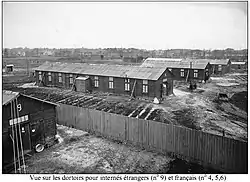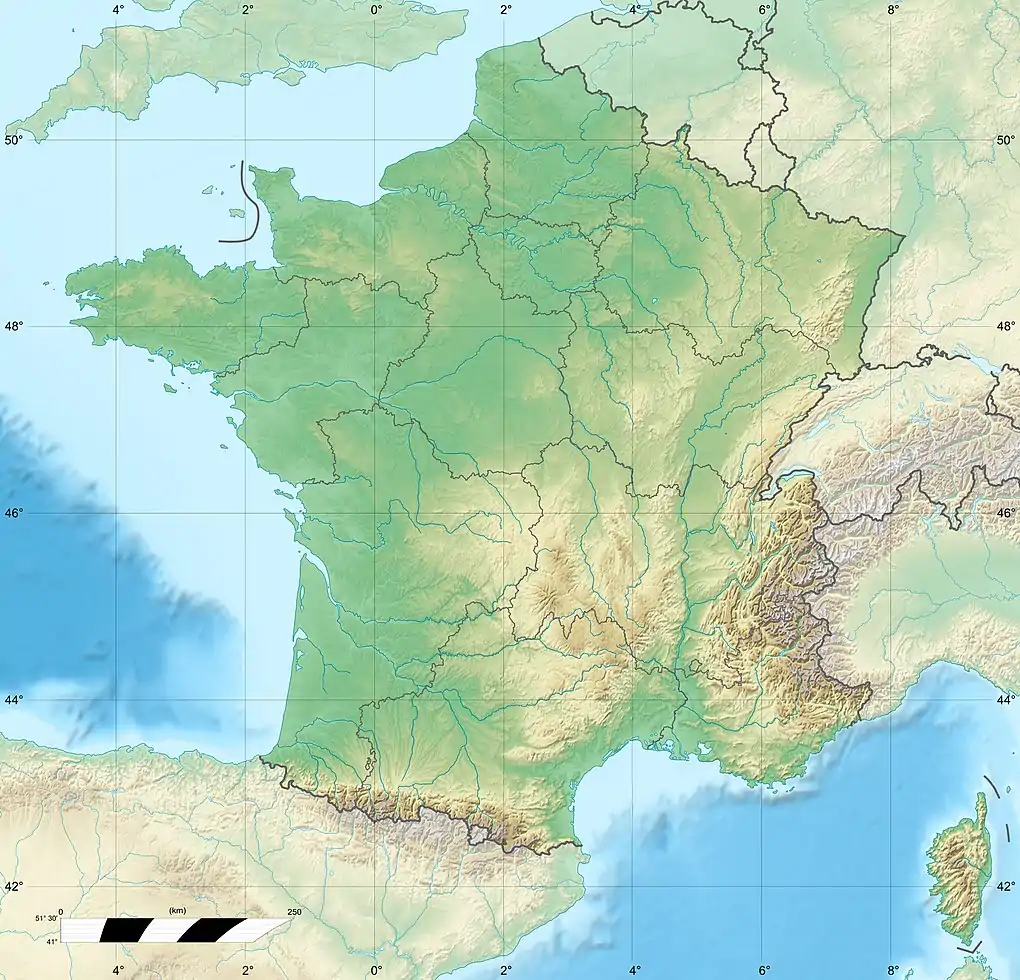Merignac internment camp
The Mérignac internment camp, also known as the Beau-Désert internment camp, was a French internment and transit camp[lower-alpha 2] for Roma, Jews, French members of the Resistance, and political prisoners; it was located in the district of Beau-Désert in the commune of Mérignac, near Bordeaux, in German occupied France during World War II.[3]
| Mérignac internment camp | |
|---|---|
| Transit camp | |
 View of camp's barracks with a fence separating French and foreign detainees | |
 Location of Mérignac internment camp within France | |
| Coordinates | 44°50′44.29″N 0°41′29.34″W |
| Other names | Camp of Beaudésert Camp of Mérignac-Beaudésert |
| Location | Mérignac, Gironde German-occupied France |
| Operated by | |
| Original use | German prison |
| Operational | 17 November 1940 – 26 August 1944[1] |
| Inmates | Roma, political detainees, French and Foreign Jews |
| Number of inmates | 8,730[lower-alpha 1] |
| Liberated by | French Resistance |
| Notable inmates | |
History
After the Fall of France, the German authorities converted a confinement center (camp de séjour surveillé), built at the site of a former WW1 laundry, in the district of Beau-Désert, near Merignac, into a prison. The Mérignac camp comprised one barrack and a barbed-wire fence, it was managed by director René Rousseau and guarded by the French gendarmerie.[1]
In December 1940, the regional prefect François Pierre-Alype, acting in accordance with orders from the Bordeaux Feldkommandantur (German Command), organised the internment of around 300 Roma (Gypsies, Tziganes or nomads in reports) including children.[1] By the end of December 1940, the internees had built a total of 20 barracks,[1] a few weeks later, the Roma were transferred to another camp, the Camp de concentration de la route de Limoges in Poitiers. On 21 March 1941, the Roma were replaced in Merignac by political detainees from the Bordeaux region when a new group of 148 communists arrived. In April 1941 came the first Jews, victims of roundups, followed by prostitutes and in June French members of the Resistance.[1] The jewish internees were temporarily held in Mérignac before getting transferred to the Drancy camp via the Bordeaux train station, while in Mérignac the Jews were segregated from the other prisoners.[1]
In October 1941, 35 of the Merignac political prisoners, arrested in 1939 because of communist activities, were transferred to the Souge military camp to be executed. Fifty hostages were shot in retaliation for the killing of German military adviser (Kriegsverwaltungsrat) Hans Gottfried Reimers, by the French Resistance, in Bordeaux three days earlier.[4] German SS-Sturmbannführer Herbert Hagenn was directly responsible for the execution of the hostages.[5] In September 1942, an additional 70 Mérignac internees were executed in Souge.[1]
The internment camp of Merignac held 560 detainees in November 1943 then 224 by April 1944; In November 1943, only 70 to 85 Jews were left in the camp, In December there were none.[1] The deportations continued in the department until June 1944, as facilitated by Maurice Papon the prefect of Gironde appointed in June 1942.[1]
On 26 August 1944, the French Forces of the Interior (Forces Françaises de l'Intérieur) liberated the remaining detainees of the Mérignac camp and replaced them with collaborators.[1]
Transfers and deportations
Convoys taking Jewish internees to Drancy for transport to the German death camps:[1]
- Convoy of 18 July 1942, (171 deportees)
- Convoy of 26 August 1942, (444 deportees including 57 children)
- Convoy of 19 October 1942, (173 deportees).
Between February and June 1943, an additional 107 Jews held in Mérignac were deported[1]
Notable Mérignac incarcerees
- Louis de La Bardonnie, member of the French Resistance[6]
- Robert Aron, French historian and writer[7]
Notes
References
- Megargee & White 2018, pp. 177–178.
- Megargee & White 2018, p. XXV.
- Leruste 2014, p. 1.
- Cobb 2009, p. 75.
- Bartrop & Grimm 2019, pp. 123–124.
- Higounet 1962, p. 230.
- Poznanski, Bracher & United States Holocaust Memorial Museum 2001, p. 64.
Sources
- Bartrop, P.R.; Grimm, E.E. (2019). Perpetrating the Holocaust: Leaders, Enablers, and Collaborators. ABC-CLIO. ISBN 978-1-4408-5897-0.
- Cobb, M. (2009). The Resistance: The French Fight Against the Nazis. Simon & Schuster UK. ISBN 978-1-84737-759-3.
- Higounet, C. (1962). Histoire de Bordeaux. Histoire de Bordeaux (in French). Fédération historique du Sud-Ouest.
- Leruste, F. (2014). Juifs internés à Bordeaux (1940–1944): le camp de Mérignac-Beaudésert (in French). Les éditions du Net. ISBN 978-2-312-02293-2.
- Megargee, G.P.; White, J. (2018). The United States Holocaust Memorial Museum Encyclopedia of Camps and Ghettos, 1933–1945, Volume III: Camps and Ghettos under European Regimes Aligned with Nazi Germany. Indiana University Press. ISBN 978-0-253-02386-5.
- Poznanski, R.; Bracher, N.; United States Holocaust Memorial Museum (2001). Jews in France During World War II. Brandeis University Press. ISBN 978-1-58465-144-4.

.svg.png.webp)